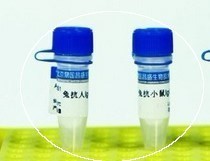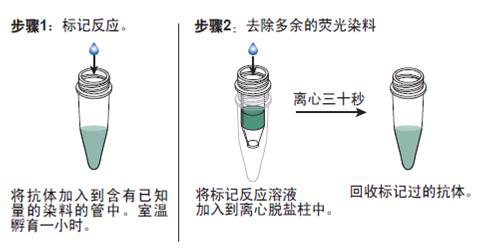
|

| 产地 | 进口、国产 |
| 品牌 | 上海莼试 |
| 保存条件 | Store at -20 °C |
| 货号 | CS9616 |
| 应用范围 | WB=1:100-500 ELISA=1:500-1000 IHC-P=1:100-500 IHC-F=1:100-500 Flow-Cyt=1:100-500 IF=1:100-500 |
| CAS编号 | |
| 抗体名 | Anti-Notch 2 |
| 克隆性 | |
| 靶点 | 详见说明书 |
| 适应物种 | 详见说明书 |
| 形态 | 详见说明书 |
| 宿主 | 详见说明书 |
| 亚型 | IgG |
| 标识物 | 详见说明书 |
| 浓度 | 1mg/1ml% |
| 免疫原 | KLH conjugated synthetic peptide derived from human Notch2 |
产品订购信息:
英文名称 Anti-Notch 2
中文名称 跨膜受体蛋白Notch-2抗体说明书
别 名 Neurogenic locus notch homolog protein 2; activated Notch 2; Notch2; hN2; Notch 2 extracellular truncation; Notch 2 intracellular domain; AGS2; hN2; Motch B; N2 antibody neurogenic locus notch homolog protein 2; NOTC2_HUMAN; Notch 2; Notch Drosophila homolog 2; Notch homolog 2; Notch homolog 2 Drosophila.


浓 度 1mg/1ml
规 格 0.1ml/100μg 0.2ml/200μg
抗体来源 Rabbit
克隆类型 polyclonal
交叉反应 Human, Mouse, Rat, Pig, Rabbit
产品类型 一抗
研究领域 细胞生物 免疫学 信号转导 干细胞 细胞膜受体
蛋白分子量 predicted molecular weight: 262kDa
性 状 Lyophilized or Liquid
免 疫 原 KLH conjugated synthetic peptide derived from human Notch2
亚 型 IgG
纯化方法 affinity purified by Protein A
储 存 液 0.01M PBS, pH 7.4 with 10 mg/ml BSA and 0.1% Sodium azide
跨膜受体蛋白Notch-2抗体说明书 产品应用 WB=1:100-500 ELISA=1:500-1000 IHC-P=1:100-500 IHC-F=1:100-500 Flow-Cyt=1:100-500 IF=1:100-500
(石蜡切片需做抗原修复)
not yet tested in other applications.
optimal dilutions/concentrations should be determined by the end user.
保存条件 Store at -20 °C for one year. Avoid repeated freeze/thaw cycles. The lyophilized antibody is stable at room temperature for at least one month and for greater than a year when kept at -20°C. When reconstituted in sterile pH 7.4 0.01M PBS or diluent of antibody the antibody is stable for at least two weeks at 2-4 °C.
Important Note This product as supplied is intended for research use only, not for use in human, therapeutic or diagnostic applications.
产品介绍 Functions as a receptor for membrane-bound ligands Jagged1, Jagged2 and Delta1 to regulate cell-fate determination. Upon ligand activation through the released notch intracellular domain (NICD) it forms a transcriptional activator complex with RBPJ/RBPSUH and activates genes of the enhancer of split locus. Affects the implementation of differentiation, proliferation and apoptotic programs.
Subunit : Heterodimer of a C-terminal fragment N(TM) and an N-terminal fragment N(EC) which are probably linked by disulfide bonds (By similarity).Interacts with MAML1, MAML2 and MAML3 which act as transcriptional coactivators for NOTCH2. Interacts with RELA/p65 (By similarity).Subcellular Location : Cell membrane; Single-pass type I membrane protein. Notch 2 intracellular domain: Nucleus.Tissue Specificity : Expressed in the brain, heart, kidney, lung, skeletal muscle and liver. Ubiquitously expressed in the embryo.Post-translational modifications : Synthesized in the endoplasmic reticulum as an inactive form which is proteolytically cleaved by a furin-like convertase in the trans-Golgi network before it reaches the plasma membrane to yield an active, ligand-accessible form. Cleavage results in a C-terminal fragment N(TM) and a N-terminal fragment N(EC). Following ligand binding, it is cleaved by TNF-alpha converting enzyme (TACE) to yield a membrane-associated intermediate fragment called notch extracellular truncation (NEXT). This fragment is then cleaved by presenilin dependent gamma-secretase to release a notch-derived peptide containing the intracellular domain (NICD) from the membrane (By similarity).DISEASE : Defects in NOTCH2 are the cause of Alagille syndrome type 2 (ALGS2) [MIM:610205]. Alagille syndrome is an autosomal dominant multisystem disorder defined clinically by hepatic bile duct paucity and cholestasis in association with cardiac, skeletal, and ophthalmologic manifestations. There are characteristic facial features and less frequent clinical involvement of the renal and vascular systems.Similarity : Belongs to the NOTCH family.Contains 6 ANK repeats.Contains 35 EGF-like domains.Contains 3 LNR (Lin/Notch) repeats.

ER- Beta (Estrogen receptor-beta) peptide 雌激素受体β抗原Multi-class antibodies规格: 0.5mg
蛇毒巴曲酶抗体 Anti-Batroxobin 0.1ml
Rhesus antibody Rh phospho-EGFR (Ser967) 磷酸化表皮生长因子受体抗体 规格 0.1ml
M199 10×1L Gibco
ZNF131 英文名称: 锌指蛋白131抗体 0.2ml
Dnmt1 英文名称: DNA甲基转移酶1抗体 0.1ml
蛇毒巴曲酶抗体 Anti-Batroxobin 0.1ml
phospho-ERK1/MAPK-1/2(pThr183 + pTyr185) 磷酸化原活化蛋白激酶1/2抗原Multi-class antibodies规格: 0.5mg
ATP敏感性通道亚基kir6.2抗体 Anti-ATP-sensitive K+ channel subunit Kir6.2 0.1ml
Rhesus antibody Rh phospho-EGFR (Tyr1110) 磷酸化表皮生长因子受体抗体 规格 0.1ml
DMEM高糖培养液 250ml 国产
ZNF852 英文名称: 锌指蛋白852抗体 0.2ml
DCP 英文名称: 异常凝血酶原/脱-γ-羧基凝血酶原抗体 0.2ml
ATP敏感性通道亚基kir6.2抗体 Anti-ATP-sensitive K+ channel subunit Kir6.2 0.1ml
ZNF23 英文名称: 锌指蛋白23抗体 0.1ml
DIS3L 英文名称: 有丝分裂控制样蛋白DIS3L抗体 0.2ml
醛糖还原酶抗体 Anti-AKR1B1/ADR 0.1ml
Anti-GST-Tag/Biotin 生物素标记兔抗重组谷胱甘肽转移酶GST标签蛋白抗体IgGMulti-class antibodies规格: 0.2ml
Rhesus antibody Rh phospho-eIF4G(ser1108) 磷酸化真核翻译起始因子4G抗体 规格 0.1ml
EBNA-3 (EpsteinBarr nuclear Anti-gens 3) EB病毒编码核蛋白-3(抗原)Multi-class antibodies规格: 0.5mg
脒多粘菌素B琼脂基础250g用于炭疽杆菌的培养及初步鉴定
DEV nutrient gelatin DEV营养明胶 1.10691.0500 MERCK默克 incubation media DEV nutrient gelatin DEV营养明胶 1.10691.0500 MERCK默克
水解酪蛋白胨(MH)肉汤 100g 适用于稀释法进行药敏试验。
Wistar大鼠脂肪间质干细胞成脂诱导分化培养基Wistarofratadiposederivedmesenchymalstemcellsintotheculturemediuminduceddifferentiationoffat
含0.6%酵母膏的胰酪胨大豆琼脂(TSA-YE) 250g 用于单增李氏菌的分纯,培养,可用于做7%羊血琼脂
联合固氮菌培养基250g用于固氮菌的分离培养
麦芽浸出液琼脂 分离计数酵母和霉菌 500g incubation media 麦芽浸出液琼脂 分离计数酵母和霉菌 500g
发根土壤杆菌(发根植物单胞菌) 支/瓶
牛津琼脂(OXA)平板(9cm)用于单增李氏菌的选择性分离
WL营养琼脂 250g 用于啤酒和发酵产品中酵母菌和细菌的计数
跨膜受体蛋白Notch-2抗体说明书 尿素琼脂培养基基础 规格: 250g 用途: 用于鉴别肠道素酶试验
缓冲动力-盐培养基 规格: 250g 用途: 供产气荚膜梭菌动力和盐还原测定用
动力—盐培养基(A法) 规格: 250g 用途: 供鉴别测定细菌液化明胶用
明胶培养基(营养明胶) 规格: 100g 用途: 供测定细菌液化明胶使用

抗体的生物素化标记实验要点:
1. 跨膜受体蛋白Notch-2抗体说明书 如在反应混合液中有叠氮钠或游离氨基存在,会抑制标记反应。因此,蛋白质在反应前要对 0.1mol/L碳酸氢钠缓冲液或0.5mol/L硼酸缓冲液充分透析;
2.所用的NHSB及待生物素化蛋白质之间的分子比按蛋白质表面的ε-氨基的密度会有所不同,选择不当则影响标记的效率,应先用几个不同的分子比来筛选最适条件;
3.用NHSB量过量也是不利的,抗原的结合位点可能因此被封闭,导致抗体失活;
4.由于抗体的氨基不易接近可能造成生物素化不足,此时可加入去污剂如 Triton x-100, Tween20等;
5.当游离ε-氨基(赖氨酸残基的氨基)存在于抗体的抗原结合位点时,或位于酶的催化位点时,生物素化会降低或损伤抗体蛋白的结合力或活性;
6.生物素还可能与不同的功能基团,如羰基、氨基、巯基、异咪唑基及*基,也可与糖基共价结合;
7.交联反应后,应充分透析,否则,残余的生物素会对生物素化抗体与亲和素的结合产生竞争作用;
8.在细胞的荧光标记实验中,中和亲和素的本底低,但由于链霉亲和素含有少量正电荷,故对某些细胞可导致高本底。
抗体的鉴定:
1)跨膜受体蛋白Notch-2抗体说明书 抗体的效价鉴定:不管是用于诊断还是用于,制备抗体的目的都是要求较高效价。不同的抗原制备的抗体,要求的效价不一。鉴定效价的方法很多,包括有试管凝集反应,琼脂扩散试验,酶联免疫吸附试验等。常用的抗原所制备的抗体一般都有约成的鉴定效价的方法,以资比较。如制备抗抗体的效价,一般就采用琼脂扩散试验来鉴定。
2)抗体的特异性鉴定:抗体的特异性是指与相应抗原或近似抗原物质的识别能力。抗体的特异性高,它的识别能力就强。衡量特异性通常以交叉反应率来表示。交叉反应率可用竞争抑制试验测定。以不同浓度抗原和近似抗原分别做竞争抑制曲线,计算各自的结合率,求出各自在IC50时的浓度,并按公式计算交叉反应率。
如果所用抗原浓度IC50浓度为pg/管,而一些近似抗原物质的IC50浓度几乎是无穷大时,表示这一抗血清与其他抗原物质的交叉反应率近似为0,即该血清的特异性较好。
3)抗体亲和力:是指抗体和抗原结合的牢固程度。亲和力的高低是由抗原分子的大小,抗体分子的结合位点与抗原决定簇之间立体构型的合适度决定的。有助于维持抗原抗体复合物稳定的分子间力有氢键,疏水键,侧链相反电荷基因的库仑力,范德华力和空间斥力。亲和力常以亲和常数K表示,K的单位是L/mol。抗体亲和力的测定对抗体的筛选,确定抗体的用途,验证抗体的均一性等均有重要意义。